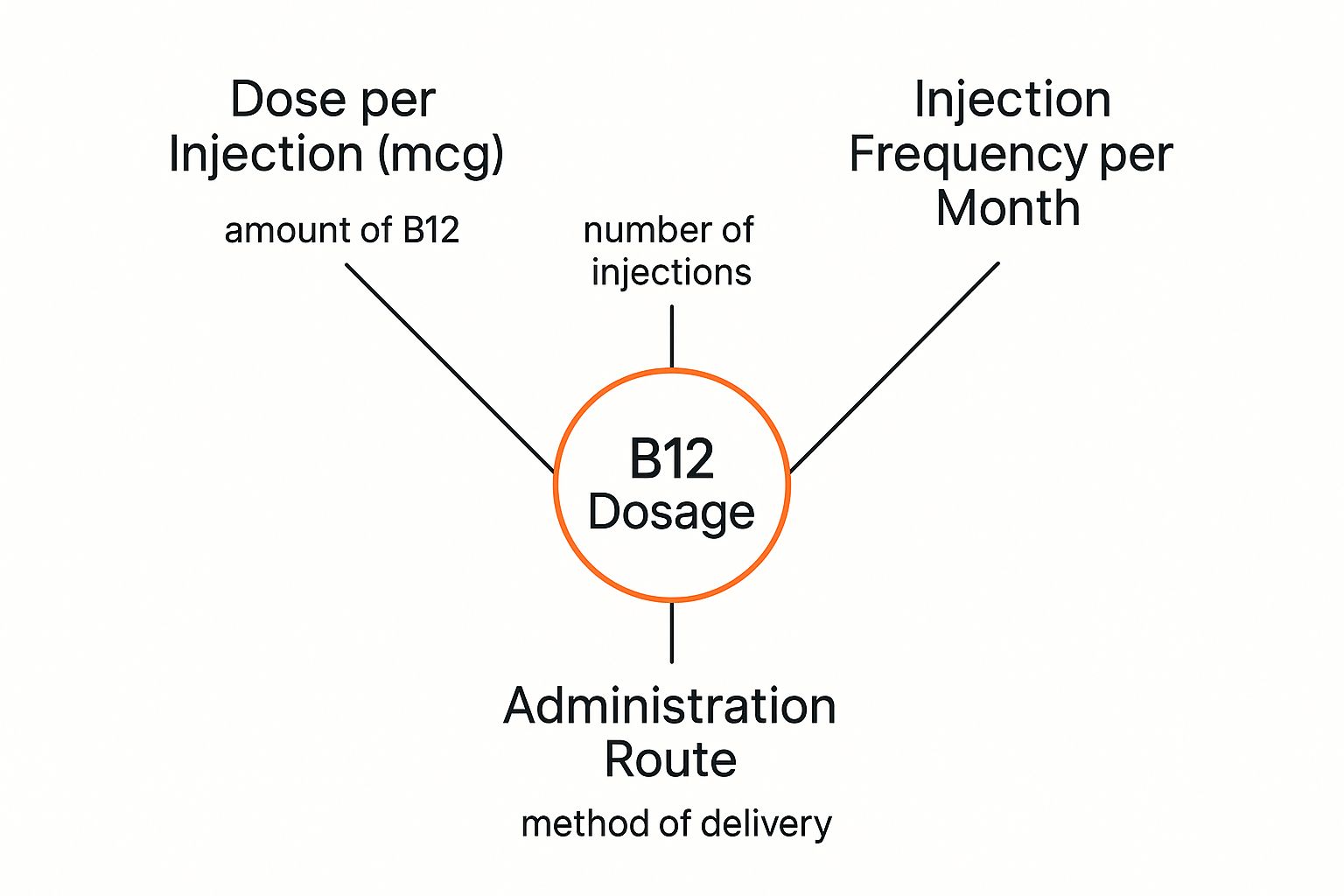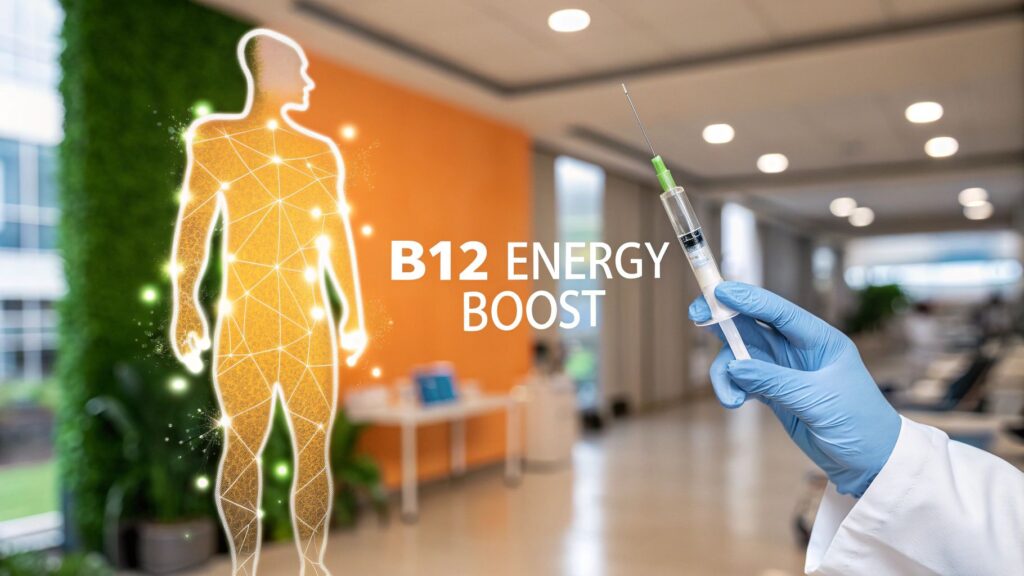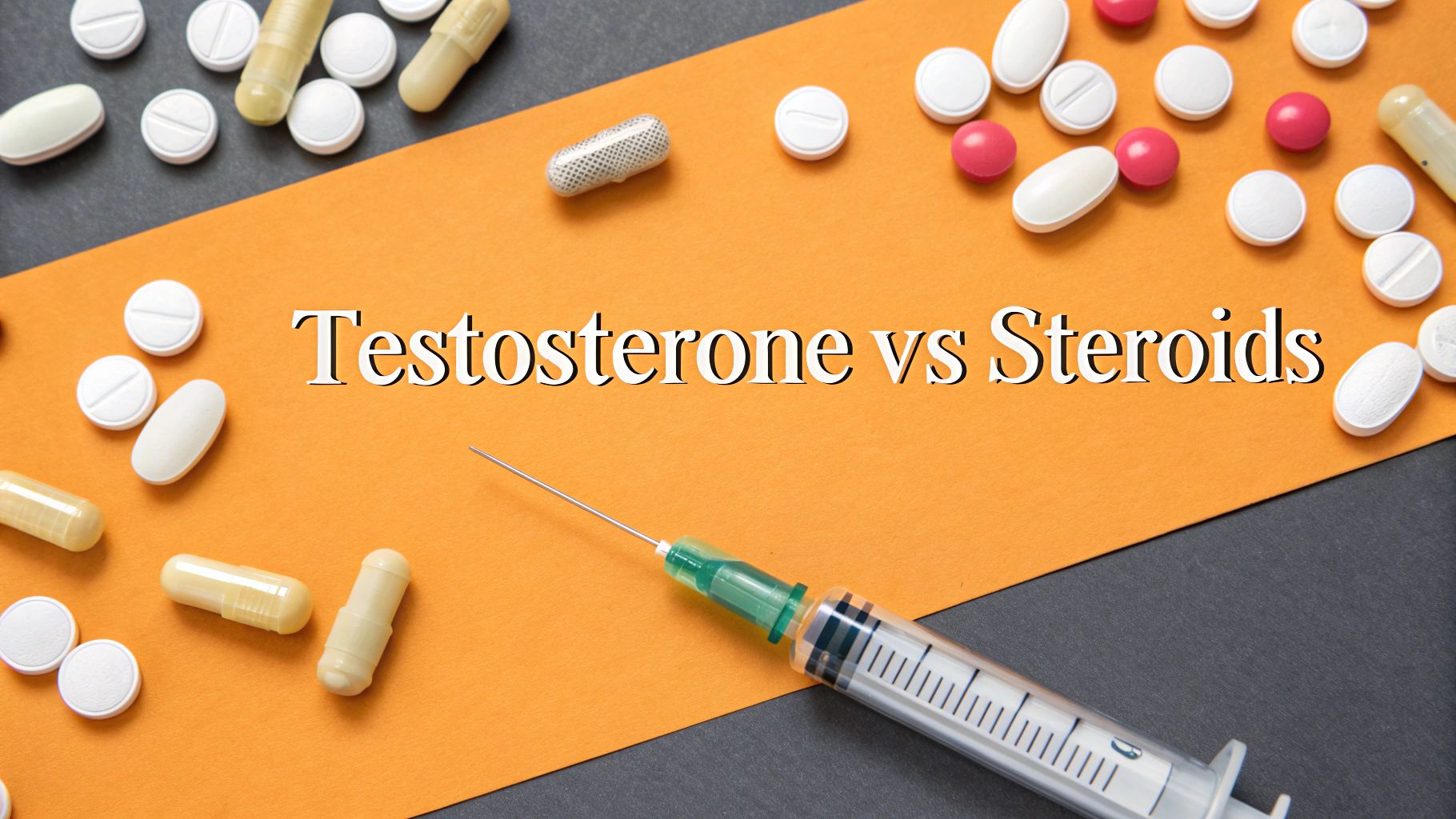Feeling drained all the time is an all-too-common complaint. So, are B12 injections the magic bullet for energy that many people claim they are?
The real answer is a bit more nuanced. For someone with a genuine, clinically diagnosed B12 deficiency, these injections can feel like a miracle—a powerful medical treatment that truly restores their vitality. But for those with perfectly normal B12 levels, they simply aren’t a universal energy booster.
Tired All the Time? How B12 Injections Can Help
That feeling of persistent fatigue can be completely overwhelming, like you’re trying to run a marathon every single day with no finish line in sight. It’s a struggle that seeps into your work, your relationships, and your overall quality of life. While plenty of factors can drain your energy, a crucial piece of the puzzle is often Vitamin B12.
Think of Vitamin B12 as the spark plug for your body's engine. Its main job is to help convert the food you eat into glucose, which is your body’s primary source of fuel. When you don't have enough B12, that entire energy conversion process sputters and stalls. The result? You feel sluggish and mentally foggy, no matter how much you rest.
Who Truly Benefits from B12 Shots
Here’s the most important takeaway: B12 injections are a targeted therapy, not a one-size-fits-all energy drink. They are specifically designed to fix a medical problem—a diagnosed deficiency.
Adding more B12 to a body that already has plenty is like trying to cram extra spark plugs into a perfectly healthy engine. It won’t make it run any faster or more efficiently. Your body will just get rid of the excess.
This therapy is a game-changer for people who can't properly absorb B12 from food or oral supplements due to underlying conditions, such as:
- Pernicious anemia: An autoimmune disorder that directly blocks B12 absorption in the gut.
- Digestive disorders: Conditions like Crohn's disease or celiac disease that damage the intestinal lining.
- Gastrointestinal surgeries: Procedures like gastric bypass can permanently alter the digestive tract.
- Certain medications: Long-term use of drugs like metformin can interfere with the body's ability to process B12.
The power of B12 injections is directly tied to a pre-existing deficiency. For those with adequate levels, lifestyle factors like sleep, diet, and stress management are far more effective tools for boosting energy.
To set clear expectations from the start, it's helpful to have a simple breakdown of who is—and who isn't—an ideal candidate for this treatment.
This table gives a quick overview.
B12 Injections At a Glance
| Factor | Description |
|---|---|
| Ideal Candidate | Someone with a confirmed Vitamin B12 deficiency diagnosed through a blood test. |
| Primary Benefit | Reverses symptoms of deficiency, such as fatigue, weakness, and brain fog, by restoring normal B12 levels. |
| Not Recommended For | Individuals with normal B12 levels seeking a general energy boost or athletic performance enhancement. |
| Mechanism | Bypasses the digestive system to deliver B12 directly into the bloodstream for immediate use. |
Understanding this distinction is the key. B12 injections are a powerful medical tool for correcting a specific problem, not a wellness shortcut for the tired but otherwise healthy individual.
Understanding Vitamin B12 and Your Body's Energy

To really get why B12 injections for energy can be a game-changer for some, you first need to understand what this vitamin actually does inside your body. Vitamin B12, also known as cobalamin, isn’t a direct source of fuel like caffeine or sugar. Instead, think of it as a master facilitator, a critical component that keeps the very systems that generate your energy running smoothly.
Imagine your body is a massive, intricate factory. In this factory, B12 is the essential foreman on the floor, making sure the most important production lines never slow down. Without it, the whole operation grinds to a halt, which is what leads to the profound fatigue people feel when they’re deficient.
The Oxygen Delivery System
One of B12’s most important jobs is helping your body make healthy red blood cells. These cells are like a microscopic delivery fleet, tasked with hauling oxygen from your lungs to every single tissue and organ—including your brain and muscles.
When B12 levels get low, your body can’t produce these red blood cells properly. The ones it manages to make are often too large and misshapen, a condition called megaloblastic anemia. This faulty fleet simply can't carry oxygen efficiently, starving your cells of the very element they need to create energy.
This oxygen shortage is why the symptoms of B12 deficiency are so widespread:
- Profound Fatigue: Your muscles and organs just don't get the fuel they need to work properly.
- Weakness: Without enough oxygen, muscle strength fades fast.
- Pale Skin: A lower count of healthy, red-colored blood cells can change your complexion.
- Shortness of Breath: Your body struggles to get enough oxygen, even with minimal effort.
This process is absolutely fundamental to your vitality. B12 is a key player in your body’s energy grid, much like how other compounds support cellular health. For those interested in learning more about another powerful cellular support treatment, you can explore information about NAD+ IV Therapy and its role in cellular repair and energy.
Fueling Your Brain and Nerves
Beyond just delivering oxygen, Vitamin B12 is indispensable for your neurological health. It’s vital for maintaining the myelin sheath, a protective fatty layer that insulates all your nerve fibers.
Imagine the myelin sheath as the rubber coating around an electrical wire. B12 makes sure that coating stays thick and intact, allowing nerve signals to zip quickly and clearly from your brain to the rest of your body.
When a B12 deficiency causes this sheath to degrade, nerve communication becomes sluggish and distorted. This breakdown shows up as cognitive and neurological symptoms that only add to the physical fatigue:
- Brain Fog: Trouble with concentration and memory becomes common.
- Mood Changes: B12 is involved in creating neurotransmitters that regulate your mood.
- Tingling or Numbness: That "pins and needles" feeling in your hands and feet is a classic sign of nerve damage.
Where Does B12 Come From and Why Do We Lack It
Vitamin B12 is naturally found almost exclusively in animal-based foods. This means meat, fish, poultry, eggs, and dairy products. Your body can’t make it on its own, so you have to get it from what you eat or from supplements.
But the journey from your plate to your bloodstream is surprisingly complex. B12 from food has to be pried away from protein by stomach acid. Then, it needs to bind with a special protein called intrinsic factor before it can be absorbed in your small intestine.
This multi-step process can easily be thrown off. People following a strict vegan or vegetarian diet are at a higher risk of deficiency simply because their diet lacks B12 sources. However, even people who eat animal products can become deficient if their absorption process is broken, which is one of the main reasons why B12 injections for energy become a necessary medical solution.
Who Actually Needs B12 Injections for Energy?

While the idea of a quick energy boost in a shot sounds tempting, B12 injections for energy aren't a casual wellness trend. They're a targeted medical therapy for people with a specific, diagnosed need. For those who genuinely require them, this treatment can be life-changing, but it’s critical to understand who actually falls into that category.
The main candidates are people whose bodies physically can't absorb or use Vitamin B12 from food or pills. For them, an injection isn't just another option; it's a necessary workaround. It bypasses a broken digestive process, delivering this vital nutrient directly into the bloodstream where it can finally get to work.
Recognizing the Telltale Symptoms
A true B12 deficiency is much more than just an "off" day. It’s a persistent, draining state that can seriously disrupt your life. The symptoms are often mistaken for simple stress or a hectic schedule, but they actually stem from the body's struggle to make healthy red blood cells and maintain nerve health.
Common signs that point toward a real deficiency include:
- Crushing Fatigue: A deep, bone-weary exhaustion that sleep just doesn't fix.
- Persistent Weakness: Feeling physically drained and lacking the strength for everyday tasks.
- Brain Fog: Trouble concentrating, memory slips, and a general feeling of mental cloudiness.
- Pale or Jaundiced Skin: A classic sign of problems with red blood cell production.
- Numbness or Tingling: A "pins and needles" feeling, often in the hands and feet, signaling nerve involvement.
These symptoms are your body’s alarm bells, warning you that a fundamental process is failing. Ignoring them can lead to more serious, long-term complications.
The Underlying Causes of B12 Deficiency
So, what medical issues actually block B12 absorption and make injections necessary? It's not just about what you eat. Several conditions can disrupt the body's ability to process this vitamin, making direct injections the only effective way to replenish your levels.
Pernicious Anemia
This is the classic case for B12 injections. Pernicious anemia is an autoimmune disorder where your immune system mistakenly attacks the stomach cells that produce a protein called intrinsic factor. Without this protein, your body simply cannot absorb B12 from your gut, no matter how much you take in.
Digestive Disorders
Conditions that cause chronic inflammation or damage to the small intestine can severely sabotage B12 absorption. The most common culprits include:
- Crohn's disease
- Celiac disease
- Inflammatory bowel disease (IBD)
Gastrointestinal Surgeries
Any surgery that removes or bypasses parts of your stomach or small intestine can permanently change your ability to absorb B12. This is a common issue for people who have had procedures like gastric bypass or surgeries to treat stomach cancer.
A Journey from Exhaustion to Energy: The Case of Sarah
Imagine Sarah, a 45-year-old teacher who felt constantly exhausted. She blamed her demanding job and busy family life, but the fatigue was becoming debilitating. After months of struggling with brain fog and a strange tingling in her feet, her doctor ran a blood test. The results were clear: she had critically low B12 levels caused by undiagnosed pernicious anemia. Oral supplements did nothing. Only after starting a course of B12 injections for energy did she finally feel the fog lift and her old vitality return. Her story makes it clear—these injections are for a diagnosed need, not a casual energy lift.
This isn't a rare problem. Globally, vitamin B12 deficiency affects an estimated 6% of adults under 60 and skyrockets to more than 20% of those over 60, making it a major public health concern. B12 injections have become a cornerstone of therapy, especially in countries with aging populations. You can learn more about the global impact of B12 deficiency and its treatment.
Medication-Induced Deficiency
Even certain common medications can interfere with B12 absorption when used long-term. One of the most well-known is Metformin, a widely prescribed drug for type 2 diabetes. Similarly, long-term use of proton pump inhibitors (PPIs) for acid reflux can reduce the stomach acid needed to release B12 from food in the first place. For people on these necessary medications, injections may be the only way to maintain healthy B12 levels and fend off deficiency-related fatigue.
Why Injections Work When Pills Don't Always Cut It
When you find out you’re low on a vitamin, grabbing a bottle of pills seems like the obvious first step. But for Vitamin B12, it’s not always that simple. The real difference between a pill and a shot boils down to one crucial factor: bioavailability.
Think of bioavailability as the amount of a nutrient that actually makes it into your bloodstream to do its job. It’s the difference between what you swallow and what your body can truly use.
Let’s use an analogy. Taking an oral B12 supplement is like trying to send a vital package through a complex and sometimes unreliable postal system. It has to navigate the harsh environment of your stomach acid, get picked up by special binding proteins, and then pass through the intestinal wall. There are so many checkpoints where that package can get lost or damaged. If any part of that system is even slightly off, your delivery might never arrive.
A B12 injection, on the other hand, is like hiring a dedicated courier. It completely bypasses the digestive system's obstacles and delivers the package directly to its destination: your bloodstream. This direct route guarantees 100% bioavailability, ensuring your body gets the full dose right away.
Overcoming the Absorption Barrier
For a lot of people, that digestive "postal system" for B12 is fundamentally broken. Issues like pernicious anemia, Crohn's disease, or even the after-effects of gastric surgery create physical roadblocks that prevent B12 from being absorbed—no matter how many pills you take.
This is precisely why B12 injections are more than just a preference for these individuals; they're a medical necessity. They are the only reliable way to get this critical nutrient into the body and start reversing the debilitating symptoms of a deficiency. To get a broader perspective, you can explore the different types and uses of injectable vitamins for humans and see how they're tailored for various health goals.
The image below gives you a clear idea of how a personalized B12 injection plan is created, considering everything from the dose to the delivery method.

As you can see, a successful treatment plan isn't just about the amount of B12. It’s also about how often and in what way it’s delivered to get the best possible results for you.
Cyanocobalamin vs. Methylcobalamin: What's the Difference?
When you get a B12 shot, it will likely be one of two main forms. Knowing the difference helps you have a more informed discussion with your doctor about what’s best for your body.
- Cyanocobalamin: This is a synthetic, highly stable, and more cost-effective version of B12. Your body needs to go through a multi-step process to convert it into a form it can actually use.
- Methylcobalamin: This is a naturally occurring, active form of B12. Since it’s already in the "ready-to-use" state, your body doesn't need to convert it.
While both are effective at correcting a deficiency, some experts lean towards methylcobalamin. They believe it’s better retained by the body and offers more direct support, particularly for neurological health.
By completely sidestepping the digestive system, B12 injections offer a failsafe solution. They ensure that people with absorption problems can efficiently restore their B12 levels and start feeling better much faster than they ever could with pills.
This direct delivery is so important because B12 is a key player in helping your body convert the food you eat into glucose—the main fuel for energy production. A deficiency can lead to crushing fatigue and weakness, which injections can quickly address by getting right to the source of the problem.
How Long Until I Feel the Effects?
Once you start B12 injections for energy, you’re probably wondering how soon you’ll feel a difference. The timeline can vary from person to person, but many with a significant deficiency report an initial surge in energy and mental sharpness within 48 to 72 hours.
This first lift happens because your body finally has the raw materials it needs to boost red blood cell production and support nerve function. But remember, true recovery is a marathon, not a sprint.
It often takes several weeks or even a couple of months of consistent injections to fully replenish your body’s B12 stores and reverse symptoms that have been building up for a long time. The sustained improvement in your energy and overall well-being typically kicks in after you've completed the initial "loading dose" course prescribed by your doctor.
Dosing, Side Effects, and Common Myths
When you're considering any new medical treatment, you need to get past the hype and into the practical details. What’s the dosing schedule really look like? What can you realistically expect to feel? With B12 injections for energy, it's especially important to separate the solid science from the popular fiction to have a safe and effective experience. Let's cut through the noise, bust the common myths, and get clear on what to anticipate.
A medical professional will determine your treatment plan only after they've reviewed your blood test results. The whole point is to get your B12 levels back to where they should be, efficiently and safely, without giving you an unnecessary excess. A standard approach often kicks off with a "loading" phase of more frequent injections before settling into a long-term maintenance schedule.
Common Dosing Schedules
While your plan will be tailored to you, most providers follow a general framework to get your levels back on track. This progressive approach ensures your body gets a steady supply of B12 to rebuild its stores without being overwhelmed.
- Initial Loading Phase: This usually involves injections of 1,000 mcg (micrograms) a few times a week for the first week or two. The goal here is to quickly raise your B12 levels to start fighting off the symptoms of a serious deficiency.
- Maintenance Phase: Once your levels are stable, the frequency typically drops way down to one injection every one to three months. How often you'll need it depends on your ongoing needs and how well your body holds onto its B12 stores.
For most people, side effects from B12 shots are incredibly mild and rare. Vitamin B12 is water-soluble, which is a huge advantage. It means your body doesn’t hang onto large excess amounts for long; it just flushes out what it doesn’t need through your urine. This excellent safety profile is a key reason it’s such a trusted therapy. The most common complaint is temporary soreness, redness, or a little swelling right at the injection site—pretty much the same thing you might feel after a flu shot.
Debunking Prevalent Myths About B12 Injections
The popularity of B12 has created some powerful myths. It’s critical to remember that B12 injections are a medical tool, not a magic wand for wellness goals that aren't backed by science.
The core truth is simple: B12 injections provide a significant energy boost only for people who are correcting a documented deficiency. For individuals with normal B12 levels, they offer no extra boost, as the body will just dispose of the surplus.
Let's tackle the two most persistent myths head-on:
- Myth #1 B12 Injections Are a Weight-Loss Shot: There is no scientific evidence that B12 injections directly cause weight loss. It’s true that restoring energy in a deficient person can make them more active, but the injection itself doesn’t burn fat or rev up your metabolism in a way that leads to shedding pounds.
- Myth #2 B12 Injections Boost Athletic Performance: Unless an athlete has an underlying B12 deficiency, extra B12 won't make them stronger, faster, or have more endurance. Athletic performance is the result of dedicated training, smart nutrition, and genetics—not an excess of a vitamin they already have enough of.
Despite the widespread belief that B12 shots are a universal pick-me-up, scientific evidence confirms their real benefit is for individuals with a diagnosed deficiency. In healthy people with adequate B12, these injections simply don't appear to improve energy or athletic performance. Major health organizations caution against using B12 injections for energy as a general wellness or weight-loss aid because of this lack of evidence. You can discover more insights about B12's proven health benefits from WebMD.
Ultimately, the key to a positive outcome is working with a professional. A proper diagnosis from a licensed provider ensures your treatment is necessary, safe, and tailored to your specific health needs, protecting you from ineffective and unnecessary procedures.
How to Get B12 Injections Safely Through Telehealth

If the signs of a B12 deficiency are hitting a little too close to home, the next move is getting clear answers from a medical professional. Not long ago, this meant juggling appointments and making trips to a lab. Thankfully, modern telehealth has streamlined the entire process, making it more convenient, private, and efficient than ever.
Getting B12 injections for energy through a telehealth platform puts you back in the driver's seat of your health, all from your own home. The process is refreshingly straightforward, starting with a simple evaluation and leading to a medically guided treatment plan if it’s the right fit for you.
Step 1: The Online Consultation
Your journey starts with an initial consultation, which usually happens on a secure digital platform. You'll begin by filling out a confidential health questionnaire, giving a licensed provider a clear picture of your symptoms, medical history, and overall health.
This isn't just a formality—it’s a critical screening process. Reputable telehealth services use this information to see if you're a good candidate for B12 testing in the first place. To get a better feel for how this works, you can find details on getting started with an online doctor consultation and see just how simple it is.
Step 2: At-Home Lab Testing
If the provider believes your symptoms call for a closer look, the next step is a blood test to check your B12 levels. The beauty of the telehealth model is that you often don't even have to leave your house for this.
Many services will mail an at-home testing kit right to your door. These kits arrive with simple, easy-to-follow instructions for collecting a small blood sample. Once you're done, you just pop it in the provided prepaid packaging and mail it back to a certified lab. It’s a convenient approach that completely cuts out the hassle of scheduling a separate lab visit.
Step 3: Professional Review and Prescription
Once the lab analyzes your sample, the results are sent securely back to your telehealth provider. A licensed doctor or nurse practitioner will then review your B12 levels, putting them in context with the symptoms and medical history you shared earlier.
This is the most important step of all. The provider will determine if you have a clinical deficiency that actually needs treatment.
If a deficiency is confirmed and your provider decides that B12 injections for energy are the right medical solution for you, they will issue a prescription. This ensures your treatment is rooted in real medical data, not just guesswork.
If a prescription is appropriate, the B12 injections and all the necessary sterile supplies are shipped discreetly to your home. You’ll receive detailed instructions, often with video tutorials, on how to self-administer the shots safely and confidently. This blend of professional medical oversight and at-home convenience makes tackling a B12 deficiency more accessible than ever before.
Your B12 Injection Questions, Answered
When you're considering a new treatment, it’s natural to have questions. You want to know the practical details—how fast it works, if it's safe to do at home, and what to expect. Let's cut through the noise and get you some straight answers to the most common questions about B12 injections.
Think of this as your practical guide, designed to give you the confidence you need to take the next step.
How Quickly Will I Feel a Difference?
This is probably the first thing on everyone's mind. For someone with a genuine B12 deficiency, the change can feel remarkably fast.
Many people report a noticeable lift in their energy and sharper mental focus within just 48 to 72 hours after their first shot. That’s because the B12 gets straight to work, helping your body produce more red blood cells and supporting your nervous system. But that initial boost is just the start.
Keep in mind, fully rebuilding your body’s B12 reserves is a marathon, not a sprint. To get lasting energy improvement, it’s crucial to follow the full injection schedule your doctor prescribes over the coming weeks or months.
Can I Get a B12 Shot Just for a Wellness Boost?
It's a common question, especially with B12 shots popping up in wellness trends. While some IV bars might offer them as an elective "energy boost," no reputable medical provider will prescribe them without confirming a deficiency through a blood test first.
Here’s why: if your B12 levels are already normal, there's zero scientific proof that an extra shot will give you more energy. Your body is smart; it will just get rid of the excess. An injection without a medical need is an unnecessary, costly procedure. The real, game-changing power of B12 injections for energy comes from correcting an actual medical deficiency.
Are At-Home B12 Injections Actually Safe?
Absolutely, as long as they are prescribed by a doctor and you follow their instructions to the letter. Modern telehealth has made this process incredibly straightforward and secure.
- Clear Guidance: You’ll get detailed instructions, often with video guides, to show you exactly what to do.
- Expert Support: Legitimate telehealth platforms give you access to medical staff who can answer any questions you have along the way.
- Sterile Supplies: Your prescription comes with all the sterile supplies you need, from needles to alcohol swabs.
This system is designed to make the simple intramuscular injection process something you can handle correctly and safely right from your own home.
What's the Difference Between Methylcobalamin and Cyanocobalamin?
You'll almost always run into these two types of B12, and while they both work, there's a key difference in how your body uses them.
Methylcobalamin is the natural, "active" form of B12. This means your body can use it right away, no extra steps needed. Cyanocobalamin, on the other hand, is a synthetic version that your body has to convert into an active form first. Because of this extra step, many practitioners prefer methylcobalamin, as it's thought to be more immediately available for your body to use.
Ready to find out if B12 injections are the right solution for your fatigue? At Elite Bioscience, we offer convenient at-home testing and private online consultations with licensed medical providers. Take the first step toward restoring your energy and vitality. Explore our B12 therapy options today.







